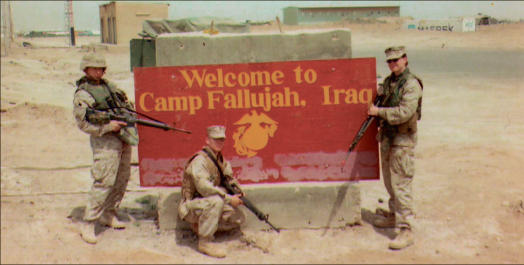
Welcome home — Stephanie Gardner along with two of her comrades at Camp Fallujah in Iraq. Gardner, a sergeant in the Marine Corps, signed up for service one year before the 9/11 tragedy. Photos provided
Upon graduating high school in 2000, Stephanie Gardner followed family tradition and joined the military. She signed up with the U.S. Marine Corps just in time to take action when the world changed on Sept. 11, 2001.
Gardner was two months into her Arabic course at the Defense Language Institute in Monterey, Calif. when the 9/11 tragedy happened. Gardner and the other students were in formation that morning when the first plane hit, and none of their instructors showed up.
Gardner said it was “really intense” because the teachers were all native to Iraq, Egypt or Lebanon.
“None of the teachers from our teaching group … showed up that day, and most of them, when they came back the next day, had reported being harassed in some way or another,” she said. “By then everyone knew some Arabic terrorist group had done it.”
Gardner deployed to Iraq in 2004 as part of the 2nd Radio Battalion where she was the assistant team leader for a “Prophet Hammer” collections platform.
Prophet Hammer is an intelligence-gathering system, and Gardner ran a shift of cryptologic linguists who translated both audio conversations and printed documents non-stop. According to Gardner, the work got tedious.
“That’s what people don’t understand,” she said. “Everything you do over there is boring until something happens, then you’re frantic for about 10 minutes, and then it’s all over, and you’re bored again.”
Aside from the tedium Gardner said it was difficult just joining the military as a woman.
She had to work twice as hard to be accepted as equal, and some men still did not think she should be there. She said it would make a feminist out of any woman.
“I don’t want to make it sound like I was constantly harassed because there were plenty of guys who worked well with me and accepted me, and we helped each other,” she said. “But for every one of those there’s another one waiting for you to struggle with something so that they can point it out as a weakness and a reason you shouldn’t be there.”
Gardner said succeeding in the Marines was all about attitude.
“I would say that it takes a specific kind of female to join and be successful in the military, and most especially the Marines, but it’s a mental effort more than a physical one,” she said. “Anyone can learn to run three miles and do some sit-ups, but from the beginning the goal of the Marines is to break you down and build you into something better, and if you’re not strong enough mentally to do that, that’s where your trouble starts.”
Gardner left the Marine Corps in 2005 to work with government contractors in Iraq. She worked as a team leader for MVM, a private security firm, and a site manager for L-3 Communications Titan Group. All together, Gardner stayed 14 months in Iraq after leaving the Marine Corps.
After finishing her contracting work, Gardner decided to return to school. Her Marine chaplain happened to be a graduate of Liberty Baptist Theological Seminary and directed her to Liberty University.
She started at Liberty in January 2008 and is studying music education with minors in linguistics and strategic intelligence.
Gardner intends to start her own school some day, but for now, she has no definite plans.
“People always ask me (what I’m going to do after graduation), and I give a different answer every time,” she laughed.
